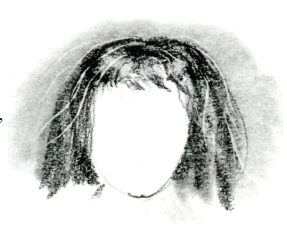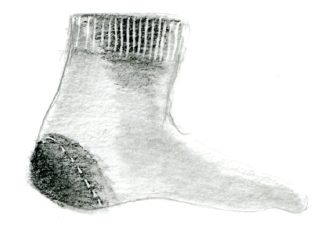Often times in drawings, there are white lines that are very fine sitting against a dark background.
Some examples are flyaway hairs, stiches in cloth, lettering, highlights in the eye, or texture in fabrics.
These lines pose a difficult problem because they’re too small to be effectively picked out with an eraser after laying in tone, avoided with pencil as you work in the rest of the picture, or masked with frisket.
The best bet in such cases is to use the indentation technique. The area that you’re indenting should be white, so clean it up before you start.
Also, this technique works best when the drawing surface is firm but padded, so stack loose paper or foam core board beneath your drawing.
Lay a piece of tracing paper over your drawing so you can see what you’re doing, and then, using a hard, sharp graphite pencil (5H or harder), draw the lines that you want to keep white. This will take firm pressure, so be careful not to tear the paper.
Remove the tracing paper and shade over the indented lines. The charcoal or graphite should skip right over the lines, leaving them white. If you made a mistake and need to fill in the line, however, you can do so with a sharp pencil and a blending stomp or tortillon.
Learn how to draw portraits like a master with our latest portrait mastery drawing course.
It’s just like having your own drawing teacher guide you step-by-step along the way without the expensive price tag.
No more smudgy mess with black and white that looks like a first grader whipped up in art class.
“Portrait Mastery” is generously illustrated showing you step-by-step just how to create a real life portrait.





